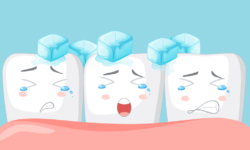Some dental conditions or sensations make it difficult to determine if a trip to the dentist is in order. But some symptoms, such as tooth sensitivity, are pretty hard to ignore. But what makes a tooth sensitive to cold and hot sensations? More importantly, how long should we wait before officially declaring the symptoms a dental emergency and booking a dentist appointment?
Those are some of the questions we’re going to answer today. But before we get too far ahead of ourselves, let’s talk about why we can have only one tooth sensitive to cold foods while others aren’t. To get to the bottom of that mystery, we have to consider the way teeth are structured.
The Anatomy of a Tooth
If we look at a cross-section image of a tooth, we’ll see three distinct sections that make up both the crown and root. The outermost layer, or the enamel, is a hard non-porous coating that protects the interior of the tooth. If the enamel cracks, the layer under it couldn’t keep bacteria from invading the core of the tooth.
After all, porous dentin is certainly a softer material than the protective enamel on the surface of our teeth. So if bacteria penetrates the tooth, working through the dentin will be all too easy. That would allow bacteria to access the pulpy core in the center of the tooth. That is where sensitivity and pain come in.
Namely, the chamber in the center of a tooth is full of blood vessels and nerves. The blood vessels are there to keep the tooth strong by carrying the nutrients it needs. However, the purpose of the nerves is to alert us when bacteria have entered our teeth. So sensitivity, discomfort, and even pain should signal that we need to schedule a dentist appointment as soon as possible.
Conversely, ignoring the pain can have disastrous consequences. If the bacteria stick around, the infection might spread to the rest of the jaw and surrounding flesh. But unless the enamel gets damaged, the chances of bacteria penetrating the tooth are slim.
Why is My Tooth Sensitive to Cold? Crown and Root Fracture Causes
So what makes a tooth sensitive to cold and hot foods and beverages? Simply put, when the surface layer of the tooth cracks, the nerve endings inside it become exposed to the elements. As such, they can be particularly receptive to changes in temperatures, resulting in discomfort and pain.
The crack in the enamel is usually visible on X-rays. So if you suspect your nerve endings are exposed, you can get the area scanned by an emergency dentist. However, the crack can often be visible — and the cause of the break is often pretty obvious too.
Most people report feeling pain after chewing nuts, candy, or ice. Alternatively, they might have gotten into a physical altercation or had an accident that resulted in facial trauma.
When Should You Seek Emergency Dental Services?
Taking into account everything we’ve discussed so far, it’s safe to assume that tooth sensitivity is not a good sign. Usually, it means that bacteria have entered the tooth and that the nerve endings inside it are exposed. If we continue eating, drinking, and living normally during this kind of tooth emergency, we may exacerbate the issue.
Remember, bacteria feeds on sugar. Every time we bite down on something, the food fills the cracks in our teeth. If our oral hygiene habits aren’t up to snuff, the food will continue rotting away in those fissures. That creates a perfect environment for bacterial growth. So when should you throw in the towel and have a professional check out your tooth?
According to the Wikipedia page about emergency dental care, which you can find here https://en.wikipedia.org/wiki/Dental_emergency, crown and root fractures are pretty serious injuries. In addition to temperature sensitivity, a tooth with damaged enamel may come with other symptoms.
For example, patients often complain that their tooth is also tender when they bite down or touch it. If the injury occurred due to physical trauma, the tooth could be mobile as well. In cases like these, we recommend scheduling an emergency dentist appointment.
Luckily, if you seek treatment on time, a dentist could simply clean out the affected area and apply a filling. But if the bacteria have reached the center of the tooth, the dentist might do a root canal procedure instead. Removing the nerves and blood vessels from the tooth could make it more brittle and therefore susceptible to future fissures.
What Can You Do to Alleviate the Discomfort at Home
If you’re unable to address your dental emergency immediately, there are some remedies you could apply in the comfort of your home. For example, you could rinse your mouth or swish it out with salt water or hydrogen peroxide. Applying a cold or hot compress to the cheek might help reduce swelling and inflammation too.
Some people also swear by different essential oils, including thyme, mint, and clove. But you wouldn’t have to use the liquid essential oil to enjoy the benefit of those herbs. You’d experience a cooling sensation by simply putting a mint teabag on the painful tooth too. Then again, you could find commercial dental products with some of those ingredients.
Mint is a particularly common ingredient in desensitizing or cooling toothpaste. But if you decide to get that kind of product, you’ll want to look for fluoride on the ingredient list too. When you finish brushing, rinse your mouth with slightly warm water to avoid triggering an unpleasant reaction.
After brushing your teeth, you could also apply a dental numbing gel like Orajel or Anbesol to the affected area. But remember, all these methods are supposed to tide you over until you can get to a dentist.
Seek Out Emergency Dental Care Services As Soon As Possible!
To conclude, let’s go over what can make a tooth sensitive to cold. Ultimately, that can only happen if the protective enamel coating on the surface of the tooth has eroded to the point of exposing the nerve endings inside the tooth. That can happen through physical injuries, cavities, and even receding gums.
But as bad as it is, the discomfort has a purpose. Ignoring the pain and letting the infection spread and fester could make the problem much worse. With that in mind, it’s best to get to an emergency dentist as soon as you notice the pain. In the meantime, the best you can do is alleviate the pain with cold compresses and numbing gels.






